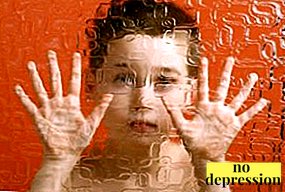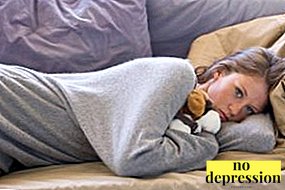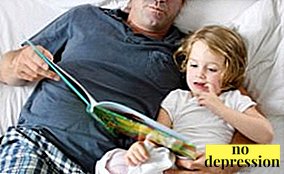It is interesting for psychologists and psychiatrists to study causes of autism in children and adults.It is useful to know about this and future parents, to reduce the likelihood of the disease.
Is it a congenital or acquired disease?

The first signs of autism appear before the age of three.
In boys, the disease is more commonthan girls.
By the time they start school, there is already a noticeable lag in development, problems with social contacts, in the emotional sphere.
From early childhood, these children do not look into the eyes, do not react to the sound of voices, with severe do not distinguish strangers from relatives.
The children of birth itself do not show positive emotions, do not distinguish their mother, while ordinary babies very quickly learn to distinguish mother from other people and get scared of strangers.
Autism is now considered to be congenital or early acquired. mental illness.
One of the versions is the viral diseases that were transferred by the mother during pregnancy and affect the development of the fetal brain.
In some cases, autism can be acquiredfor example, after injuries.
Genetics

Is autism a genetic disease or not?
Despite the prevalence of the disease, autism is not yet fully understood.
In addition, it has various forms, which implies certain difficulties in diagnosing.
Exists theory of genetic mutations. Autism is becoming more common, and some scientists and researchers suggest that this is due to poor ecology, the use of drugs, vaccinations and other factors affecting the change in genes.
Studies have shown that if an autist child is born in a family, then the risk of the next one with a similar diagnosis is about 3 times higher than in families where there are no autists.
The exact autism gene has not yet been identified, so it is impossible to say unequivocally that the disease is of a genetic nature.
Still exist various genetic mutations which manifest in children with this disease.
Is it inherited?

If one of the parents is autistic, then psychiatric research The risk of having a child with this syndrome is higher.
However, it is not known exactly whether this is due to the transfer of certain genes, or whether the social factor and the example of adult behavior play a role.
People with severe autism practically do not marry, however if the form is light, it is likely that the creation of a family and the transfer to children of genes that provoke the appearance of the disease
Nature of occurrence
At present, one can only assume why a particular child was born with autism syndrome. However, in many cases reasons remain unclear.
Complications during pregnancy in mothers of future autistic children are much more common.
It is believed that they do not directly cause the appearance of the syndrome, but increase its risk. Therefore, if revealed strong toxicosis, birth injuries, bleedingThis does not mean at all that a child will be born with certain diseases.
Why are children born autistic?

The exact reasons have not yet been clarified, but it is known that the biological basis is brain malfunction.
Newborns with autism syndrome can be born for a number of reasons:
- complications during pregnancy;
- transferring pregnant viral diseases;
- complications during childbirth;
- heredity - the risk increases if there are relatives suffering from the syndrome;
- medication during pregnancy;
- negative environmental factors, alcoholism, smoking, drug addiction of the mother and father.
In families where an autist is born, relatives often have other symptoms and diseases, such as epilepsy, schizophrenia, obsessive behavior, reduced need for social contacts, and mental retardation.
Causes in young children
Children with early autism syndrome often have other genetic diseases - syndrome of fragile X chromosome, phenylketonuria, and more.
Irregularities can be observed in the frontal regions of the cerebral cortex, cerebellum, hippocampus, temporal lobes, and amygdala.

As a result, memory, attention, emotional self-regulation, the ability to feel and respond to the feelings of other people suffer.
Teratogenic theory assumes that exogenous factors act on the child's body - the impact of the environment, which has a negative effect on the fetus.
These may include food products with hazardous additives, intake of harmful substances - nicotine, alcohol, drugs, as well as the impact of urban air, living close to industrial enterprises. Toxicosis, fetal hypoxia are also among the risk factors.
Other theories suggest a failure in immunity, fungal infections, the age of the parents.
Some authors point to vaccination from various diseases, but the link between autism and vaccines has not been proven.
There are children's autism:
- endogenous and hereditary;
- exogenous organic;
- psychogenic;
- unclear etiology.
Pathogenetic approach divides autism into:
- hereditary constitutional;
- hereditary procedural;
- acquired postnatal.
What happens to teenagers?

The development of autism is different.
With the right therapy you can smooth the course of the diseaseand the child learn to live in society.
In adolescents, autism does not disappear by itself if the diagnosis was made at an early age.
With malignant course can turn into schizophrenia, social maladjustment increases. When wavy periodic exacerbations occur. Symptoms can also be regressed, improved.
Teenagers can manifest atypical autismwhich appears not at an early age, but in any.
In the period of growing up, the hormonal background changes, it affects all systems of the body, including brain activity.
The social environment also has a great influence., past illnesses, chronic stress, for example, rejection by classmates. All of these factors can trigger autism or its worsening.
Acquired from adults
The main cause of autism in adults is genetic predisposition and later development of the disease.
The following can provoke the appearance of the disease factors:
- changes in the usual way of life - change of work, place of residence, social circle;
- chronic stress when living in a big city;
- stress arising from the fact that the intellectual abilities of the individual do not meet the requirements imposed on him;
- excess information;
- constant failures in personal and professional spheres, which leads to changes in the psyche and the work of the brain;
- hormonal disorders.

A person who has a predisposition to the development of autism is different already in childhood.
He is more closed, he has problems arise with communication, lack of spiritual affection, does not start a personal relationship, the presence of other people in his life does not matter, and is sometimes perceived as a negative factor.
She shows indifference to her own children, sometimes anger. Attachment to children is not true, but imposed stereotyped social behavior.
Is it possible to prevent development?

It is important to understand that if at least one of the relatives or parents suffered from autism, then the chance of his development in a child is higher.
To reduce the likelihood of a disease, must adhere to the rules:
- Plan a pregnancy, do preliminary examinations, study the medical history of a family of parents.
- Eliminate the ingestion of parents, and especially the mother, of harmful substances - food additives, nicotine, drugs, alcohol, dangerous drugs, even before conception.
- Eliminate the presence of hidden infections.
- Undergo a course of therapy if diseases have been identified that increase the risk of problems with the fetus.
- Take vitamins as prescribed by a doctor.
- Try to be less in areas with adverse environmental conditions.
- It is advisable for a pregnant woman to protect herself from contact with sick people and animals, for example, toxoplasmosis is dangerous for the fetus, which in latent form is often found in cats.
- Avoid stress.
- A pregnant woman should give herself light physical activity, a sedentary and a lying lifestyle can negatively affect the fetus and provoke complications during childbirth.

Of course, even following all the instructions of the doctor, one cannot be sure that the child will not show early autism syndrome or illness. will not be revealed later.
You can reduce the risk of the disease, but it is completely impossible to prevent it, especially if there is a genetic predisposition.
ABOUT the reasons autism in this video:



